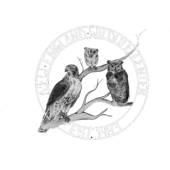There is nothing cuter than wild animal babies, and nothing more tempting than to want to cuddle them, raise them and feed them. They bring out the mothering instinct in us because they look so vulnerable. Many people think “how hard can it be?” “just give them a bottle or some birdseed “. The truth is that it is very hard to raise any wildlife, and even the best intentions usually end up harming or killing the animal.
We are just finishing up with baby season at the Cape Wildlife Center and have cared for 2100 animals so far this year. Some were brought to us immediately upon being found orphaned, and did well and were released. Some were kept for days, even weeks and sometimes years being fed the wrong diet and cared for in an inappropriate habitat. All these people were trying to do the best thing, had consulted the internet, talked to friends, but in the end the animal suffered because of inadequate care.
Please do not try to care for or feed wildlife. Wild animals need to be raised by rehabilitators in Massachusetts, not only because it is their best chance of survival, but because it is the law. The Cape Wildlife Center is open 7 days a week 9-4 to receive sick, injured or orphaned wildlife.
The most frequent problem we see is in animals that have been given formula. Each species and each age needs a different kind of formula. If given goat milk, kitten formula, etc. they may be ok for a few days but then their digestive tract can’t handle it and they may bloat or have diarrhea, dehydrate and die. They also can get formula into their lungs (aspiration) and choke or develop pneumonia. Many of our small mammals cannot feed by sucking on a nipple. They are fed by passing a tube directly into their stomach to avoid these problems. These include bunnies, opossums, and raccoons. When we get animals that have been improperly fed it takes a lot of care to try to get them healthy again.
Animals also develop problems if they are given too much protein, or if their diet is lacking in vitamins and minerals. This year we received 12 baby opossums that had been illegally kept and fed nothing except raw chicken for 7 weeks. They were then brought to us because they couldn’t walk and were very sick. They had all developed Metabolic Bone Disease (MBD) from their inadequate diet. They were severely lacking in calcium, similar to the human condition rickets. We immediately adjusted their diets and gave supplements to increase their calcium, but despite weeks of care, 10 of the 12 died and could never walk. Now 10 weeks later we have 2 left: one that is well enough to be released, and the other that didn’t develop enough to be in the wild so we are looking for a placement as an educational animal. Had they been brought to us immediately, there is a good chance they all would have survived and been able to released back into the wild.
Angel Wing is another common problem we see in birds, mostly waterfowl who are fed an improper diet rich in protein and carbohydrates, like bread, and crackers. This diet accelerates the growth of the wing which causes it to have improper bone support. The wing then twists outward and drags on the ground. These birds can’t fly. It is not reversible. If they had been fed corn, greens, grapes or birdseed this would not have happened. One of our major public educational campaigns is to get people to stop feeding bread and crackers to birds.
Turtles are a species that people commonly take from the wild and raise as pets. In Massachusetts most of our turtles are endangered or threatened and we try very hard to keep their numbers stable. As with any wildlife , they are illegal to keep as pets. Turtles develop many serious issues in captivity. They are prone to a Vitamin A deficiency that leads to abscesses in their ear cavity. This is directly related to their diet. When we get these turtles at our center they need to have surgery to remove the abscess under sedation ( which is always risky for reptiles), and then are put on antibiotics for the infection and pain medication. Reptiles heal very slowly so these turtles may be with us for months. Turtles also need UV light, Vitamin D, and the proper water temperature and salinity. If any one of these factors are off they can get quite sick or develop problems with their shells which can include shell rot, pyramiding of the shell and metabolic bone disease.
Feeding wildlife interferes with the natural healthy balance between populations along with these broader issues:
Fed wildlife get used to the presence of people and they can become a threat to both human and animal safety.
Feeding wildlife can lead to overabundance of populations in a habitat that cannot support them.
Feeding promotes the concentration of animals in one small area which can accelerate the spread of disease. Many of these diseases like chronic wasting disease in deer are difficult to eliminate.
Human food is not a healthy diet for wildlife. It can lead to malnutrition and permanent damage, sometimes death.
Animals that are fed year- round may alter their natural behaviors, become less wild, and therefore less valuable to humans who now see them as a nuisance. Think about our Canada Goose population.
Good intentions can have bad results. With education, we hope to help people understand the best way to live in harmony with our wildlife.
To learn more about the Cape Wildlife Center or help in their mission, visit www.capewildlifecenter.com or call 508 362-0111.
Caryn Ritchie is the volunteer coordinator for the Cape Wildlife Center and holds both a Massachusetts rehabilitator’s license and a federal permit to rehabilitate migratory birds.

Recent Comments